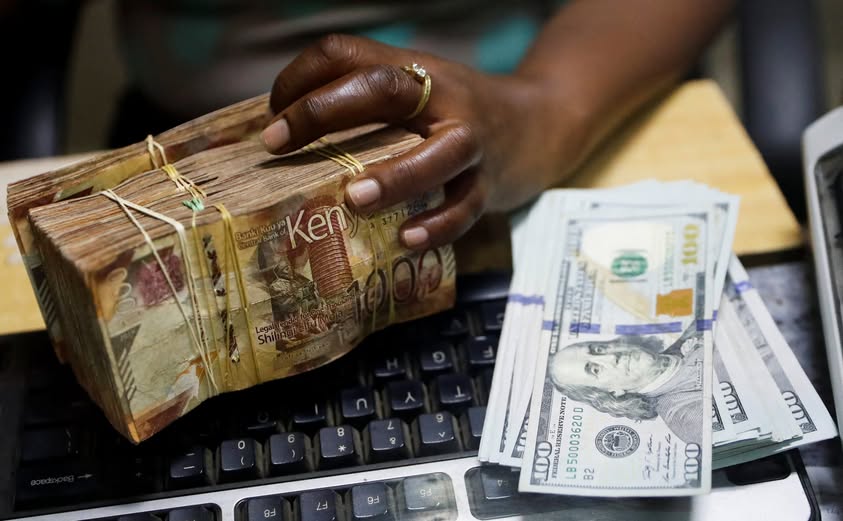Business
CBK Flags 15 Banks in Suspicious Forex Transfers
Most of these transactions are tied to foreign currency repatriation and supporting the liquidity needs of subsidiaries abroad.

Fifteen commercial banks operating in Kenya have been identified as key channels for ferrying large volumes of foreign currency out of the country.
This development has raised concerns over potential money laundering, currency volatility, and regulatory loopholes in the country’s financial system.
According to a Central Bank of Kenya (CBK) survey conducted among 38 licensed commercial banks, 39.4 per cent—or 15 institutions—admitted to regularly transporting physical cash across the country’s borders.
Most of these transactions are tied to foreign currency repatriation and supporting the liquidity needs of subsidiaries abroad.
“The movement of large amounts of physical cash across borders, whether legitimate or illicit, continues to pose significant risks not only to Kenya but to the global financial system,” CBK said in the report.
“Despite existing regulatory measures, smuggling and courier-based cash movement present enforcement and oversight challenges,” the apex bank added.
It said the main destination countries for the cash are the United Kingdom, United States, Germany, Switzerland, South Sudan, and the Democratic Republic of Congo.
The currencies involved are primarily US dollars, Euros, and British pounds. Banks said most of this cash originates from customer deposits and group subsidiaries.
While 87 per cent of the 15 banks involved claimed to have policies guiding cross-border cash handling—including cash declaration forms and identification of couriers—CBK warned that loopholes remain.
The central bank pointed out that although a majority of the banks claim to conduct Know Your Customer (KYC) and Customer Due Diligence (CDD) checks, there are still significant gaps in technology use and inter-institutional cooperation that create room for illicit transactions.
“There is still insufficient technological capacity to detect smuggling attempts, and in some cases, banks have reported uncooperative clients or receiving institutions. These shortcomings hinder the ability to track and verify the legitimacy of cash flows,” CBK added.
Transaction reports
From 2022 to 2024, only four suspicious transaction reports (STRs) linked to cross-border cash were filed with the Financial Reporting Centre (FRC), raising questions over enforcement rigour.
Most of the flagged institutions said they rely on internal investigations, with only 36 per cent referring irregular cases to law enforcement agencies.
The current system is heavily reliant on physical inspections and documentation, making it vulnerable to exploitation.
Stakeholders in the financial sector have called for stronger oversight and enhanced cooperation between banks and regulators.
They are pushing for centralised databases of cash declarations at all ports of entry and real-time access for licensed financial institutions.
The CBK survey further noted that 67 per cent of the banks had experienced at least one instance of cash smuggling or irregularities in cross-border reporting in recent years, though such incidents were described as rare.
To address the challenges, the CBK recommended that financial institutions conduct annual audits of cross-border cash handling, train frontline staff to detect suspicious transactions and automate monitoring processes.
Enhanced due diligence for high-risk profiles and mandatory reporting of all repatriated cash at the point of entry were among the key proposals.
The bank has urged the creation of a unified framework that would allow financial institutions to verify declarations made at the country’s ports of entry, especially as global scrutiny over financial transparency intensifies.
Kenya’s strategic position as a financial and logistics hub in East Africa makes it particularly vulnerable to cash-based crimes.
The country has already strengthened its anti-money laundering laws in recent years, but CBK says enforcement remains uneven.
“This is a wake-up call,” the CBK concluded in the report.
Kenya Insights allows guest blogging, if you want to be published on Kenya’s most authoritative and accurate blog, have an expose, news TIPS, story angles, human interest stories, drop us an email on [email protected] or via Telegram
-

 Grapevine6 days ago
Grapevine6 days agoAlleged Male Lover Claims His Life Is in Danger, Leaks Screenshots and Private Videos Linking SportPesa CEO Ronald Karauri
-

 Lifestyle1 week ago
Lifestyle1 week agoThe General’s Fall: From Barracks To Bankruptcy As Illness Ravages Karangi’s Memory And Empire
-

 Grapevine2 days ago
Grapevine2 days agoRussian Man’s Secret Sex Recordings Ignite Fury as Questions Mount Over Consent and Easy Pick-Ups in Nairobi
-

 Investigations2 weeks ago
Investigations2 weeks agoEpstein Files: Sultan bin Sulayem Bragged on His Closeness to President Uhuru Then His Firm DP World Controversially Won Port Construction in Kenya, Tanzania
-

 News2 weeks ago
News2 weeks agoAUDIT EXPOSES INEQUALITY IN STAREHE SCHOOLS: PARENTS BLED DRY AS FEES HIT Sh300,000 AGAINST Sh67,244 CAP
-

 Business2 weeks ago
Business2 weeks agoKRA Can Now Tax Unexplained Bank Deposits
-

 Investigations1 week ago
Investigations1 week agoEpstein’s Girlfriend Ghislaine Maxwell Frequently Visited Kenya As Files Reveal Local Secret Links With The Underage Sex Trafficking Ring
-

 News1 week ago
News1 week agoState Agency Exposes Five Top Names Linked To Poor Building Approvals In Nairobi, Recommends Dismissal After City Hall Probe














